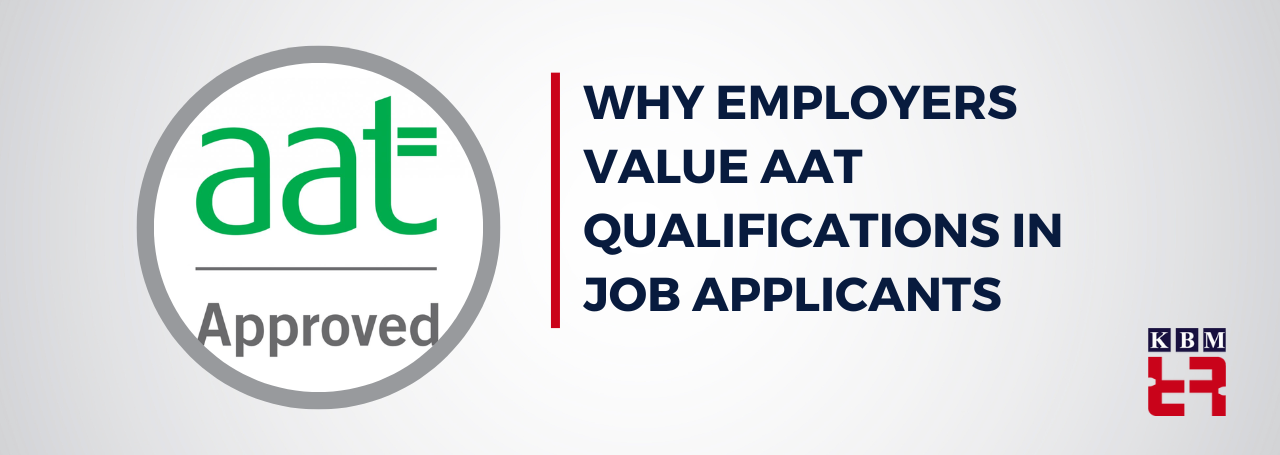Accountancy is a key area for businesses of all sizes. Companies need skilled accountants to manage their financial matters as they grow and evolve. The Association of Accounting Technicians (AAT) qualification has become a respected standard in the accounting industry. Employers highly value AAT qualifications because they ensure candidates have the understanding and practical skills to succeed.
AAT qualifications provide candidates with an in-depth understanding of accounting principles. They prepare individuals for the complex demands of modern finance roles. This article explains why employers seek applicants with AAT qualifications.
Recognised industry standard
The AAT qualification is well respected throughout the accounting profession. It has a reputation for high standards and a hands-on learning style. This ensures that it's a reliable certification employers look towards when making appointments.
An AAT qualification indicates that a candidate has acquired the skills required for different accounting operations. Employers understand that a qualified AAT professional can handle duties such as bookkeeping, financial reporting, and payroll administration confidently and competently.
Practical skills
One of the reasons employers value AAT qualifications is the practical skills they offer. AAT students learn by doing, using real-world accounting software and systems. This hands-on approach helps them gain experience in the tools and processes used in everyday business operations.
Employers appreciate candidates who are job-ready from day one. AAT-qualified candidates bring practical knowledge to the workplace, which means they can contribute immediately without requiring extensive training.
Professionalism and credibility
Employers accept AAT qualifications as evidence of a candidate's professionalism. The process of AAT certification is rigorous and demanding, showing a great deal of dedication on the part of the individual. Employers regard AAT-qualified candidates as sincere professionals who have spent time and effort gaining the knowledge and skills required.
This reliability increases the employer's confidence in the applicant's capability. It indicates that the person is committed to a career in accounting and willing to face the demands of the position.
Adaptability
The AAT qualification helps individuals develop a broad range of accounting skills. These include areas like taxation, budgeting, and financial management. As businesses expand and evolve, they need accountants who can handle various tasks. AAT-qualified candidates are adaptable and capable of managing multiple responsibilities across different aspects of finance.
Employers value candidates who can work flexibly and handle diverse tasks. This versatility makes AAT-qualified candidates attractive to businesses that require accountants with broad skill sets.
Career progression
AAT qualifications provide a clear route to career development. They form a sound basis for further qualifications, including ACCA, CIMA, or ACA. Employers recognise that AAT-qualified individuals are keen to keep learning and developing within the profession.
This emphasis on professional growth is valuable to employers because they wish to have employees dedicated to progressing in their careers. Those with AAT certifications demonstrate possibilities of future development in the organisation and become long-term investments.
Enhanced employability
AAT-qualified individuals often have higher employability than their peers without formal qualifications. Many employers prioritise candidates with an AAT qualification because it indicates they have proven competence in accounting tasks.
AAT qualifications set candidates apart in a competitive job market. For employers, hiring an AAT-qualified individual reduces the risk of hiring an individual lacking the required job skills. It ensures that the candidate is well-prepared to perform the role to a high standard.
Compliance and regulation knowledge
Employers also appreciate AAT qualifications because they guarantee that the candidates are well-versed with industry regulations and compliance. The accounting profession is highly regulated, and companies must ensure they meet the current laws and tax legislation. AAT-qualified candidates are trained on these variables, preventing employers from experiencing legal issues and penalties.
Employers rely on AAT-qualified professionals to manage complicated regulatory compliance. They believe these individuals will keep themselves updated with changing tax laws and reporting accounting standards.
Commitment to continuous learning
AAT qualifications also show a candidate's dedication to continuous learning. The accounting field is ever-evolving, with newly introduced regulations, software, and methods appearing regularly. Employers value employees dedicated to staying informed and continuously improving their skills.
AAT-qualified candidates understand the importance of ongoing professional development. Employers appreciate this commitment to growth, as it shows that the individual will adapt to changes in the industry and continue to provide value to the business.
Conclusion
Employers value AAT qualifications because they give candidates practical skills, professionalism, and credibility. The AAT qualification is recognised as being at a high standard within the accounting sector, and it will enable candidates to establish the foundation for a successful finance career. Employers recognise that AAT-qualified individuals are flexible, skilled, and dedicated to ongoing learning, making them sought-after employees.
For job applicants, obtaining an AAT qualification can open many doors in accounting. It boosts employability, builds career prospects, and enhances the chances of success in the job market.






















